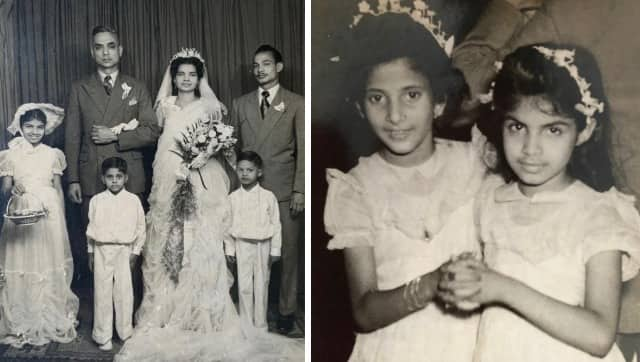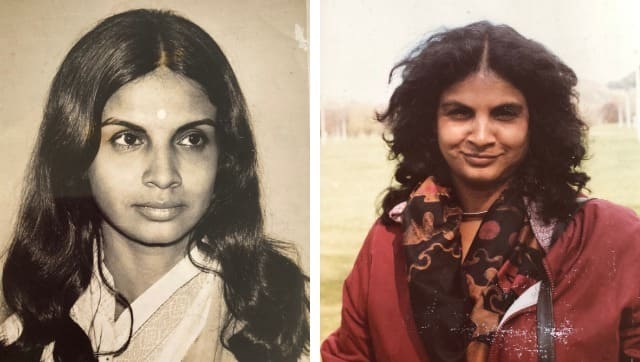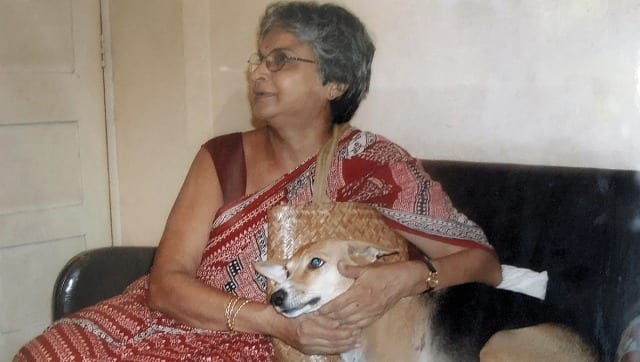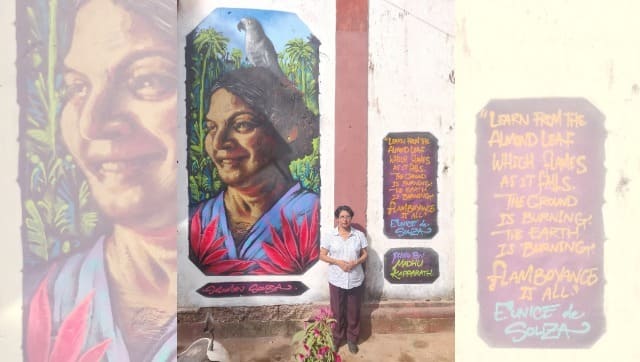It’s a story that doesn’t get old. It also happens to be my first and most defining memory of the late poet, teacher, literary critic, researcher and novelist Eunice de Souza — or as we called her at home, Aunty Nonie. De Souza is my mother’s first cousin, and easily one of the most accomplished people in the family. I grew up with little knowledge about her and everything I learned was from stories my mother told me. This was my favourite. My mother, Lorraine, was studying at Sophia Polytechnic. One of her friends was a former student of de Souza and they often discussed her lectures. One day, the two of them decided to sneak into de Souza’s English literature class at St. Xavier’s College. De Souza walked in, took roll call and then calmly said, ‘Will Lorraine and Tasneem [she remembered her name] please leave my classroom’. It didn’t matter that my mother just wanted to attend one lecture or that they were family — she had broken a rule and so, she wasn’t allowed. Every time I hear the story, it makes me wish I had been a student in that class and benefitted from de Souza’s immense knowledge. [caption id=“attachment_8652711” align=“alignnone” width=“640”]  Eunice as a flower girl at her aunt’s wedding. All photos courtesy Joanna Lobo[/caption] De Souza grew up in Pune, in my great grandfather’s home. She and her mother moved there after the death of her father — he was a forest officer in Madhya Pradesh. She grew up being called nanhi (small), which the family Anglicised to Nonie. Aunty Nonie inherited her love for literature from her father — he used to write stories — and his brother. By the time my mother was born (she was the eldest), she had left for Bombay to study. She doted on my mother and her three siblings — she was instrumental in choosing their names — and the feeling was reciprocated. “She was like our elder sister,” says my mum. “She introduced us to literature, fine arts, and took us to museums and art galleries. She built our library collection.” She visited Pune nearly every weekend, often bearing gifts in the form of books, picked up by the dozen. On request, she would play the grand piano at home. She had already developed her sense of style by then: she wore her hair long and parted in the centre, and had started wearing saris. She bought the material in Pune and would get her famous sleeveless blouses stitched at the tailor’s next door. “She loved giving us surprises,” says my aunt, Marisa Athaide. “She got us our first dog, a Yorkshire terrier we named Danny. She actually carried him in the Deccan Queen in a bag.” Another ‘surprise’ was dedicating her first book, a retelling of Akbar and Birbal, to my mother and her siblings. Though the family weren’t there for her book launches, a signed copy of every book would find its way to Pune. Aunty Nonie was thoroughly disappointed that none of her cousins came to Xavier’s to study. The family made frequent trips to Bombay and she played guide, taking them to eat at Café Samovar and showing them around Jehangir Art Gallery. She was generous to a fault. “You just had to point out what you wanted, and she would buy it,” says mum. Her greatest satisfaction was in knowing that the gift was well-received, and she would often enquire about whether the recipient was using it. When she returned to India after her stint abroad, her trunks were full of books and gifts. Her return caused a fair bit of drama. Neighbours gathered in their balconies – my family waited out on the street – to welcome her. She came in a Victoria carriage, dressed in a sari and a long coat, with a big bindi on her forehead, and on her arm, a white man. No one remembers what happened to the man. I would like to think that Aunty Nonie shut down all talk of marriage and the family yielded. [caption id=“attachment_8652731” align=“alignnone” width=“640”]  Photos from Eunice’s earlier years[/caption] Aunty Nonie raised the toast at my parent’s wedding, where she disappointed my father by focussing entirely on extolling my mother’s virtues. My mother married in Goa and my childhood rarely featured visits to Bombay so we only knew her as mum’s famous cousin in Bombay. I tried reading her books but found them incomprehensible. It frustrated me. I asked my mother why her books were so popular; “I don’t understand her writing,” I’d grumble. “You will once you’re older,” was my mother’s patient reply. She was right. It was after coming to Mumbai to work that I fully understood Aunty Nonie’s legacy. Journalists would look at me in awe when I mentioned we were related and be quite disappointed on learning that we weren’t close. I couldn’t give them any insight into this great woman. She was as much a stranger to me as she was to them. Then, I ended up living a floor above her in Vakola, with her aunt and my grandaunt. In that year, I gained a better understanding of Aunty Nonie’s life and her works. I started enjoying her books. I devoured Dangerlok because it felt autobiographical and got me thinking about why no one spoke about Aunty Nonie’s ‘flames’. In Fix, whose book cover features a close up of her face — what a power move — I looked for clues about her life. I found references to relatives scattered in her poems. Much of her work can be considered autobiographical but as she often maintained, ‘in a sense, everything one does is autobiographical, though it may not appear so’ [Nether magazine, 2014]. [caption id=“attachment_8652741” align=“alignnone” width=“640”]  Eunice De Souza[/caption] The perks of living next door meant I could go over and borrow books. She had an extensive library — the precious books were in the bedroom and the classics in a bookshelf in the hall. She received many books for review and gave a lot of the ‘rubbish’ ones away. If my hand hovered above a bad book, she would tell me to choose another. On learning I liked detective fiction, she introduced me to Nordic noir. We usually spoke about dogs: her parrot didn’t like me but her dogs did, and she told me stories of all the strays she fed in the building. She was curious about my mum’s life and mine in Goa, and she wrote about it in her column at Mumbai Mirror. She also had an interesting collection of English film DVDs, many of them of the romance genre. I always had the feeling she didn’t like me much. She would ask about my work and stories I was working on (back then, they weren’t great). She did help me get an interview with Meenal Baghel of Mumbai Mirror whom she called a ‘good but tough editor’. I didn’t ace that interview and I did feel guilty for letting her down. I’ve been wanting to write this tribute for three years but didn’t think I had enough to say. She wasn’t my teacher, we didn’t share a close bond, and she didn’t influence my foray into journalism. After her death, three years ago this day, there was an outpouring of tributes from former students, established writers and important folk. I felt lost. Aunty Nonie was family, and yet, my memories of her seemed so pale and insignificant compared to those beautiful obituaries. [caption id=“attachment_8652751” align=“alignnone” width=“640”]  The Solomon Souza mural painted on the wall of a home in Eunice’s ancestral village of Saligao. Standing by the mural is the writer Joanna Lobo’s mother, Eunice’s cousin.[/caption] However, even if subtly, Aunty Nonie did have an impact on my life. The biggest lesson I learned from her was the importance of living on your own terms. She had an opinion and wasn’t afraid to voice it. In the same Nether interview, she’s spoken about how there were undiscovered poets in India doing work that was “far more interesting than Tagore. Tagore was very bland in comparison”. She didn’t care that she fit into people’s stereotypes of a spinster; she embraced it. While she loved some parts of the family and showered them with care and attention, she had little patience with the rest. I understood her absolute dedication to dogs — she didn’t like leaving them alone and would often sleep on the floor so the dogs could take her bed. I admired her strong feminine voice, her no-nonsense attitude, and her disdain for convention. At her funeral, I almost laughed out loud at how much Aunty Nonie, an atheist till the end, would’ve hated the very religious affair. I may not have many memories of Aunty Nonie, but I can hear her voice in the books she left my mother (now all mine!). She lives on in the sepia-tinted family photos, in the family stories (now legendary), in her poetry, and in that beautiful Solomon Souza mural painted on the wall of a home in her ancestral village of Saligao.
It was only after coming to Mumbai to work as a journalist that I fully understood Aunty Nonie’s legacy. Or as the world knew her, the late poet, teacher, literary critic, researcher and novelist Eunice de Souza.
Advertisement
End of Article


)
)
)
)
)
)
)
)
)



